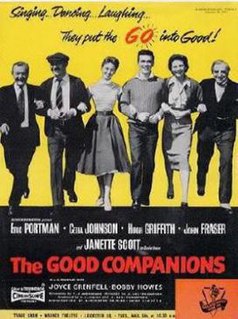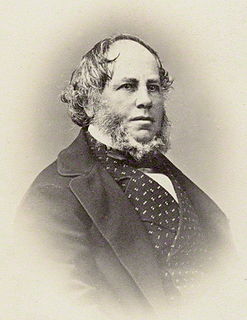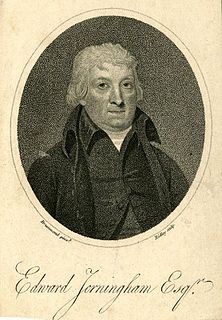
Edward Jerningham Wakefield, known as Jerningham Wakefield, was the only son of Edward Gibbon Wakefield. As such, he was closely associated with his father's interest in colonisation. He worked for the New Zealand Company and later was a member of the Canterbury Association. He was active as a politician in New Zealand, both at national and provincial level, but became an alcoholic and died penniless in an old people's home.

Baron Stafford, referring to the town of Stafford, is a title that has been created several times in the Peerage of England. In the 14th century, the barons of the first creation were made earls. Those of the fifth creation, in the 17th century, became first viscounts and then earls. Since 1913, the title has been held by the Fitzherbert family.

Costessey is a civil parish situated 4 miles (6.4 km) west of Norwich in Norfolk, England. The parish comprises two settlements: the long-established village of Costessey, and New Costessey, which developed during the first half of the 20th century and has become a suburb of Norwich. The two settlements are separated by the River Tud and by arable land. Costessey's northern boundary with Taverham, Drayton and Hellesdon follows the course of the River Wensum.
Sir Robert Drury,, knight, and Lord of the Manor of Hawstead, Suffolk, was Knight of the Body to Kings Henry VII and Henry VIII, Knight of the Shire for Suffolk, Speaker of the House of Commons [elected 4 October 1495], and Privy Councillor. He was also a barrister-at-law. His London townhouse was in Drury Lane.
Thomas Alexander Fraser, 12th Lord Lovat and 1st Baron Lovat, KT was a Scottish peer. He was also the 21st MacShimidh, the traditional Gaelic Patronym for the Chiefs of the Clan Fraser.

The Jerningham Baronetcy, of Cossey in the County of Norfolk, was a title in the Baronetage of England. It was created on 16 August 1621 for Henry Jerningham. The 5th Baronet married Mary Plowden, only daughter of Mary Plowden, sister of John Paul Stafford-Howard, 4th Earl of Stafford and de jure 5th Baron Stafford. He was succeeded by his son, the sixth Baron. In 1807 the claim to the barony of Stafford, which had been under attainder since 1680, passed to him through his mother. He died in 1809 when the baronetcy and the claim to the barony passed to his son, the seventh Baronet. He petitioned the House of Lords for a reversal of the attainder of the barony of Stafford and for a writ of summons to Parliament. In 1824 the attainder was reversed and the following year he was summoned to the House of Lords as the eighth Baron Stafford.
Longridge Towers School is a non-selective co-educational independent day and boarding school near Berwick-upon-Tweed, Northumberland, England, for children between the ages of three and eighteen. It is the only independent school near the town and the only independent school in the county which educates children from reception to sixth form.

The Good Companions is a 1957 British musical film directed by J. Lee Thompson and starring Eric Portman. It is based on the novel of the same name and is a remake of the 1933 film version.
Mary Scrope was the granddaughter of Henry Scrope, 4th Baron Scrope of Bolton, and the sister of Elizabeth Scrope (d.1537), wife of John de Vere, 13th Earl of Oxford, and Margaret Scrope, wife of Edmund de la Pole, 3rd Duke of Suffolk. She is said to have been in the service at court of King Henry VIII's first four wives. As the wife of Sir William Kingston, Constable of the Tower of London, she was in attendance on Anne Boleyn during the Queen's brief imprisonment in the Tower in May 1536, and both she and her husband were among those who walked with the Queen to the scaffold. By her first husband, Edward Jerningham, she was the mother of Sir Henry Jerningham, whose support helped to place Queen Mary I on the throne of England in 1553, and who became one of Queen Mary's most favoured courtiers.
Sir Henry Jerningham KB was an English courtier during the Tudor period. He was a Gentleman Pensioner during the reign of Henry VIII. In the succession crisis of 1553 he was one of the foremost supporters of Mary Tudor, and after her accession was one of her most trusted servants, being appointed Vice-Chamberlain of the Household, Captain of the Yeomen of the Guard, and a member of the Privy Council.

Costessey Hall was a manor house in Costessey, Norfolk, England, four miles west of Norwich. The first mention of it dates to 1066, when William I gave it to Alan Rufus, Earl of Richmond. It was then described as Costessey Manor.

Henry Valentine Stafford-Jerningham, 9th Baron Stafford DL, known as Henry Jerningham until 1824 and styled The Honourable Henry Stafford-Jerningham between 1824 and 1851, was a British peer and politician.
Jerningham is a surname. Notable people with the surname include:
A Romance of Old Baghdad is a 1922 British silent drama film directed by Kenelm Foss and starring Matheson Lang, Manora Thew and Roy Travers. It is an adaptation of the novel Miss Haroun al Rashid by Jessie Douglas Kerruish. In nineteenth century Mesopotamia a series of romantic entanglements ensue. The Hollywood actress Evelyn Brent was originally intended to star but did not ultimately appear in the finished film.
Henry Jerningham was an English courtier.
The City of Wellington by-election 1858 was a by-election held in the multi-member City of Wellington electorate during the 2nd New Zealand Parliament, on 27 July 1858.
Sir Richard Jerningham was a soldier and diplomat in the service of King Henry VIII.

Edward Jermingham was a poet who moved in high society during the second half of the 18th century. Born at the family home of Costessey Park in 1737, he died in London on 17 November 1812. A writer of liberal views, he was savagely satirised later in life.
Branded is a 1920 British silent drama film directed by E. H. Calvert and starring Josephine Earle, Dallas Anderson and Nora Swinburne.








